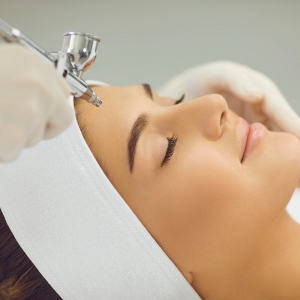Chemical Peel

Chemical Peel
What are Chemical Peels?
Chemical peels are a cosmetic treatment in which chemical solutions are applied to your skin to allow the upper layer of the dermis to exfoliate & eventually peel off. This action promotes the growth of new skin, which is much smoother, clearer, healthier, & less wrinkled. Chemical face peels can reduce fine lines & blemishes such as acne scars, uneven skin tones, & other skin imperfections, & can be performed on the face, neck, or hands. Different chemicals are used in the solution for your skin peeling treatment based on your chosen depth of peel & the type of skin condition being treated.
Chemical Peel Procedures
Chemical peel treatments are fairly straightforward procedures. You can expect the following:
- Step 1: A chemical peel treatment is usually performed in a doctor’s office or in a surgery center as an outpatient procedure (in the case of deep peels)
- Step 2: A chemical peel specialist will take an analysis of the state of your skin & offer a chemical peel treatment plan based on the condition of your skin, goals, & other factors
- Step 3: Before the procedure, the doctor will likely ask you to tie back your hair & wear eye goggles for protection
- Step 4: Then, they will thoroughly cleanse your face to remove any excess oils from your skin, followed by numbing the area being treated with a topical anesthetic
You can choose from three different types of chemical peels, depending on the strength of the procedure.
Superficial Peel
Superficial/ light peels consist of weak acids that only penetrate the outermost layer of the skin. For a superficial peel, a cotton ball, gauze, or brush will be used to apply a chemical solution to the treatment area. You may feel a slight stinging sensation on your skin, which is indicative of the solution working. Once complete, the solution will be removed, or a neutralizing solution will be added.
Medium-Strength Peel
Medium peels use relatively stronger acids to reach the middle & outermost layers of the skin. During a medium peel, your doctor will use a cotton ball, sponge, or gauze to apply a chemical solution to the face, usually containing glycolic acid. Your skin will start to whiten, & you may feel a stinging sensation for up to 20 minutes after the procedure. Your doctor may also apply a cold compress to your face to help with the prickliness you feel on your skin. After the procedure, any leftover chemical solution on your skin is wiped off from your face.
Deep Peel
Deep peels use a relatively stronger acid such as phenol or trichloroacetic acid to fully penetrate the middle layer of the skin to remove damaged skin cells. In the case of a deep chemical peel, you will likely be sedated. The doctor will use a cotton-tipped applicator to apply the chemical solution to your skin at intervals of 15 minutes. This is to limit your skin’s exposure to acid.
Why are Chemical Peels done?
Chemical face peels are a skin resurfacing procedure capable of treating various skin conditions to drastically improve the skin’s appearance. Chemical face peel treatments are used to treat wrinkles, discolored skin, scars, & several other skin flaws. Skin peels are available in several different solutions that are used to perform the procedure at varying depths. Deep peels offer more dramatic results but take more recovery time.
Skin peeling treatments remove the top layer of your skin to promote the growth of new & healthy skin cells & are effective in battling acne & treating dull & stressed skin. Chemical peels can also combat skin issues such as hyperpigmentation & sun damage, leaving you with bright & radiating skin. Additionally, chemical face peel treatments can help play an important role in battling signs of aging, such as wrinkles & fine lines, so that you always keep looking young & beautiful.
Who needs Chemical Peels?
Chemical face peel treatments are among the best solutions for men & women seeking non-surgical skin rejuvenation. If you’re tired of your acne scars or are unhappy with the appearance of your skin due to age-related concerns, then a chemical peel treatment is exactly what you need! As chemical peels work on all skin types & tones, they are a perfect treatment option for anyone. However, historically, fair-skinned patients respond better to chemical face peels than darker-skinned patients.
Unfortunately, bulges, severe wrinkles, & saggy skin does not respond well to chemical face peel treatments. Additionally, a chemical peel treatment may not be for you if you are pregnant, currently breastfeeding, have frequent outbreaks of cold sores, or have keloid scarring.
Risks & Side Effects of Chemical Peels
While getting a chemical face peel may be extremely beneficial for your skin, it may also pose some side effects. Redness in the treatment area may last for a few months following the procedure. You may also experience swelling or scabbing for a few days after treatment. Applying a cold compress can significantly reduce the swelling. There is also a low risk of chemical skin peel treatments causing bacterial, viral, or fungal infections if your skin is not properly managed post-procedure.
How to Prepare for a Chemical Peels?
If not done properly, chemical face peels can result in several complications. This is why you must follow your dermatologist’s instructions both before & after the chemical peel treatment. Before your chemical face peel, you must:
- Avoid excessive sun exposure for at least 72 hours
- Stop taking Accutane six months before the treatment procedure
- Apply topical products as instructed by your doctor before treatment to prepare your skin
- Avoid retinoids for at least two weeks before the treatment
What to Expect after Getting a Chemical Peel?
After receiving the chemical face peel treatment, you must avoid any strenuous exercise for at least five hours. It is important to note that your skin will be much more sensitive following the procedure as its top layer has been removed. This is why patients must also avoid sun exposure as much as possible for at least a week after the procedure. When going out, you must apply sunscreen. Also, avoid rubbing or scratching your skin for a few days after the procedure.
Results of a Chemical Peel
Since every patient is different, chemical peel results vary from patient to patient based on their skin conditions, age, depth of treatment, & other factors. For superficial/light chemical face peels, patients usually notice an enhanced skin tone & texture along with a significant reduction in the appearance of wrinkles. However, these results are subtle at first but progress after repeat sessions. If you receive a medium chemical face peel, you may start noticing your results sooner (around 3-5 days following the procedure), & you’ll find your skin notably smoother than before. After a deep chemical peel procedure, patients almost instantly notice a dramatic improvement in the appearance of the treated areas.
Chemical Peel Treatment in Dubai & Sharjah
If you’re wondering where you can get a chemical peel treatment in Dubai or Sharjah, look no further. Medcare is the UAE’s premier clinic offering a host of aesthetic skin rejuvenation treatments for everyone. Book an appointment, & one of our professionals will recommend a treatment plan tailored just for you based on your skin condition, laxity, & cosmetic goals. At Medcare, we recognize that all our patients are unique. That’s why we offer a variety of bespoke personal treatments to best enhance your skin features. Contact us today to book an appointment for your chemical peel treatment in Dubai.
Chemical Peel Specialists in Dubai & Sharjah
While chemical peels are fairly straightforward procedures, care needs to be taken. If the chemical skin peeling treatment is not performed properly, it can lead to several complications. This is why it is important that you only trust experienced professionals for a chemical face peel treatment in Dubai & Sharjah. At Medcare, we have the best professionals in the cosmetics industry to provide you with the most comfortable experience possible. Our team of talented individuals is committed to providing the best level of care & safety to all our patients.
Our Specialists


























